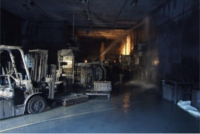The August 28, 2016, nitrous oxide explosion at the Airgas manufacturing facility in Cantonment, Florida was caused by an ineffective process safety management system (PSM), according to the U.S. Chemical Safety Board’s (CSB) final report on the incident, which killed the only Airgas employee working at the facility that day and heavily damaged the plant. The problem: a majority of PSM’s specialized rules are not required for nitrous oxide facilities.
Nonetheless, facilities should have good safety management systems in place to mitigate the risks of nitrous oxide, said CSB Chairperson Vanessa Allen Sutherland. “Safety management systems standards are critical to identify, evaluate, and control process safety hazards. This tragedy in Cantonment should not be repeated.”
Causes
The CSB investigation found that the contributing causes of the explosion all stemmed from the lack of a PSM system:
- Even though heat from the pump was a known hazard, Airgas did not evaluate safer design options that could have eliminated the need for the pump altogether;
- The company did not perform a management of change review or hazard analysis before installing the pump to identify and control hazards; and
- Safeguards installed by the company, including the safety interlock to automatically shut down the pump, and flame arrestors were likely ineffective, and failed to prevent the incident.
The Airgas Cantonment facility is one of four manufacturing plants in the United States producing nitrous oxide for industrial facilities, hospitals, and universities. The Airgas process includes pumping liquid nitrous oxide from storage tanks into trailer trucks or shipping containers, which deliver the product nationwide.
How it happened
On the day of the explosion, the Airgas operator likely began the transfer process. Under normal operating conditions, nitrous oxide is stable and can be safely handled; however, under certain conditions it can decompose explosively. CSB investigators found that a pump used to transfer nitrous oxide into a trailer heated the gas above its safe operating limit and triggered a violent decomposition reaction. The reaction migrated from the pump into the trailer causing the explosion. The explosion scattered large metal fragments for hundreds of feet, damaged the facility, and killed the Airgas operator.
Lead Investigator Dan Tillema said, “We looked at other possible causes such as static electricity, but the available evidence, it appears that the bypass of the safety interlock on the pump during startup likely allowed the pump to overheat and trigger a decomposition reaction.”
Recommendations
As a result of its investigation, the CSB issued safety recommendations to Airgas, the Compressed Gas Association, and to two nitrous oxide pump manufacturers. The recommendations include the development and implementation of a safety management system standard for nitrous oxide manufacturing as well as the distribution of increased warnings about nitrous oxide decomposition hazards.
Chairperson Sutherland said, “Our recommendations reiterate the importance of safety management systems as critical to control hazards during the manufacturing, transferring, and shipping of nitrous oxide. Strong safety management systems are good business practices, which also save lives.”
The CSB is an independent, non-regulatory federal agency charged with investigating serious chemical incidents. The agency's board members are appointed by the president and confirmed by the Senate. CSB investigations look into all aspects of chemical accidents, including physical causes such as equipment failure as well as inadequacies in regulations, industry standards, and safety management systems.
The Board does not issue citations or fines but does make safety recommendations to plants, industry organizations, labor groups, and regulatory agencies such as OSHA and EPA.



